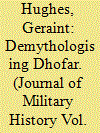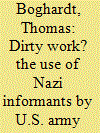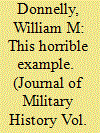|
|
|
Sort Order |
|
|
|
Items / Page
|
|
|
|
|
|
|
| Srl | Item |
| 1 |
ID:
138438


|
|
|
|
|
| Summary/Abstract |
As Army chief of staff, secretary of state, and secretary of defense, George C. Marshall played a major role in creating, implementing, and defending the multilateral “Europe-First” global strategy that guided U.S. foreign and military policies through World War II and the Cold War. This lecture explores how and why he did so, emphasizing the decision to defeat Germany before Japan, the postwar European Recovery Program that bears Marshall’s name, and the relief of General Douglas MacArthur during the Korean War for his refusal to accept this grand strategy. In the process it analyzes the complex relationship that exists between diplomatic and military history.
|
|
|
|
|
|
|
|
|
|
|
|
|
|
|
|
| 2 |
ID:
138443


|
|
|
|
|
| Summary/Abstract |
This article re-examines the civil war (1963–1976) between the Sultanate of Oman and the Popular Front for the Liberation of Oman (PFLO), particularly the U.K.’s support of the government. Using archival evidence and private papers, it argues that the counter-insurgency (COIN) campaign’s image as “population-centric” is flawed, and that the British and Omani governments relied more on military measures against the PFLO to recapture Dhofar province than on the “hearts and minds” and civil development programmes emphasised in traditional accounts. It counsels against using Dhofar as a possible example of indirect military assistance in contemporary COIN, arguing that the conflict’s specific historical characteristics may not be replicated now or in the immediate future.
|
|
|
|
|
|
|
|
|
|
|
|
|
|
|
|
| 3 |
ID:
138442


|
|
|
|
|
| Summary/Abstract |
After World War II ended in 1945, U.S. Army intelligence agencies, especially the Counter Intelligence Corps, recruited former Nazi officials, war crimes suspects, and war criminals to collect information on communist party and Soviet activities in Europe. While studies have examined individual cases, this article seeks to establish the historical context of the early Cold War that set the framework for this intelligence exploitation. It also weighs the intelligence value of the Army’s Nazi informants and reviews recruitment by other American and Allied intelligence services. Finally, it discusses the challenges of using ethical guidelines in recruiting secret agents, during the early Cold War and beyond.
|
|
|
|
|
|
|
|
|
|
|
|
|
|
|
|
| 4 |
ID:
138441


|
|
|
|
|
| Summary/Abstract |
For residents of many rural areas of southern Italy, the arrival of the Allies in 1943 was their first direct experience of the Second World War. Popular history has often focused on stories of Allied POWs cared for by selfless peasant families who were keen to join the fight against fascism. However, for many southern Italian areas the experience of war was quite different. The closing years of the war became a struggle with hunger and disease and a coming to terms with an Allied occupation that brought about more casualties and destruction than action by German forces had caused. This article focuses on the little known region of Molise, in central southern Italy. It uses primary source material from the Archivio di Stato (state archive) in Campobasso, the capital of Molise, substantiated by more than thirty interviews with elderly residents of the area, to piece together the experience of Allied military government from an Italian perspective. In doing so, it seeks to offer a new and more complete picture of the Allied military occupation of Italy.
|
|
|
|
|
|
|
|
|
|
|
|
|
|
|
|
| 5 |
ID:
138440


|
|
|
|
|
| Summary/Abstract |
The instrumental role Marie von Clausewitz played in the life of Carl von Clausewitz and the publication of his seminal work On War is often alluded to but seldom studied. The main reason for this is the fact that although Marie saved and shaped Clausewitz’s legacy, few of her own letters were published and the majority assumed lost. In July 2012, the Prussian Privy State Archives in Berlin received a truly sensational find – the full private correspondence between Marie and Carl von Clausewitz. The most valuable among them are 283 never-before published letters from Marie to her husband. They finally allow her influence over the great military theorist and her contribution to his lifework to be studied in depth. Their intellectually intensive correspondence was often echoed in Carl von Clausewitz’s writings. Marie von Clausewitz’s connections and political activism provided her husband with insight and access into the highest circles of power. Finally, by editing and publishing On War she saw his life work fulfilled.
|
|
|
|
|
|
|
|
|
|
|
|
|
|
|
|
| 6 |
ID:
138439


|
|
|
|
|
| Summary/Abstract |
On 27 July 1214, the French king Philip II defeated a coalition of rebellious magnates and the German emperor in the Battle of Bouvines. The battle became celebrated on the French side as the first moment when all elements of society, noble and common, came together to defend the nation. This paper argues that, in fact, towns had long been participants in the military growth of France’s Capetian monarchy. A multitude of other combatants were on hand for both sides besides the knights who dominate the contemporary narratives, including mounted sergeants, mounted crossbowmen, and infantry. It is suggested here that medieval towns were home to these other soldiers. In addition, we need to appreciate the roles of towns as nodes of military production, sources of finance for war, and shapers of policy
|
|
|
|
|
|
|
|
|
|
|
|
|
|
|
|
| 7 |
ID:
138444


|
|
|
|
|
| Summary/Abstract |
The decision in 1965 to expand the U.S. Army's active force without a reserve mobilization quickly generated massive organizational turbulence. In this environment one unwilling soldier found an extraordinary opportunity to slip away.
|
|
|
|
|
|
|
|
|
|
|
|
|
|
|
|
|
|
|
|
|